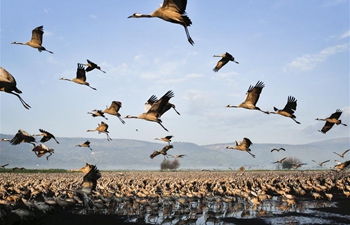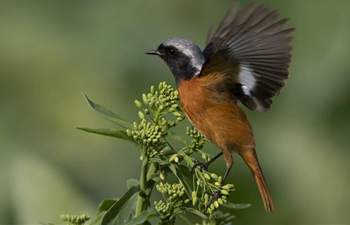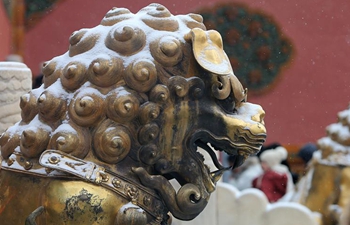Giant Panda Mei Xiang plays in the giant panda house at the Smithsonian's National Zoo in Washington D.C., the United States, on Feb. 23, 2019. The Smithsonian's National Zoo in Washington D.C. held a housewarming event inside the giant panda house on Saturday to celebrate the completion of a new visitor exhibit. (Xinhua/Ting Shen)
WASHINGTON, Feb. 23 (Xinhua) -- The Smithsonian's National Zoo in Washington D.C. held a housewarming event inside the giant panda house on Saturday to celebrate the completion of a new visitor exhibit.
The celebration featured frozen treats for giant pandas and red pandas, as well as interactive games and activities for visitors.
The new exhibit, according to the zoo, teaches visitors about the ecology, history, reproduction, conservation and care of giant pandas and enables them to learn about these unique bears and their natural habitat.
It also chronicles "the advances that panda scientists in China and at the Smithsonian have made during the past four decades."
"So much has changed for giant pandas, for the better, in the past decade," Steven Monfort, the John and Adrienne Mars Director of the Smithsonian's National Zoo and Conservation Biology Institute, said in a statement.
"This updated exhibit is really inspiring because it shows how much of a difference we can make with science and cooperation," he said, noting that "Smithsonian and Chinese scientists have been collaborating for decades, and visitors can see the results of our work as they walk through the panda house."
"Giant pandas are China's national treasures," said Minister Xu Xueyuan, the Chinese embassy in the United States. "Although they are large in size, they are also charming, tolerant, and peace-loving, representing many values of China itself, and are loved by people all over the world."
"Giant pandas are also symbolic of the China-U.S. friendship," she told a ceremony at the giant panda house.
The housewarming was jointly hosted by the zoo and the Chinese embassy.
Giant pandas live mainly in southwest China's Sichuan Province as well as neighboring Shaanxi and Gansu.
The latest census in 2014 found there were 1,864 giant pandas alive in the wild. The number of pandas bred in captivity reached 548 globally as of November, 2018, according to China's National Forestry and Grassland Administration.
At the zoo's David M. Rubenstein Family Giant Panda Habitat currently live three giant pandas, Mei Xiang, Tian Tian and their three-year-old son, Bei Bei.
The Smithsonian's National Zoo is one of Washington D.C.'s most popular tourist destinations and is part of the Smithsonian Institution, a world-renowned museum and research complex.


















